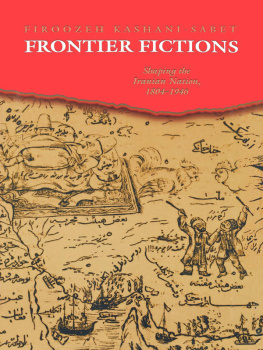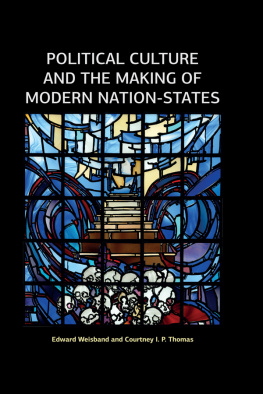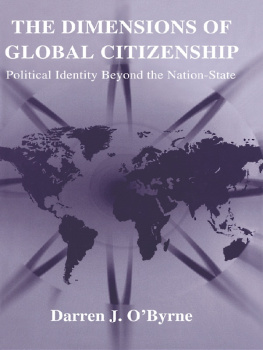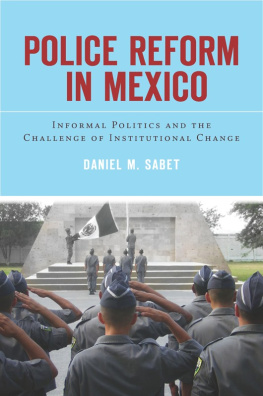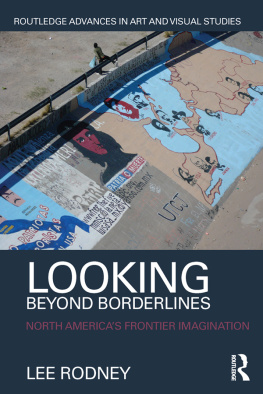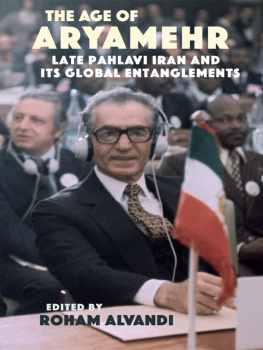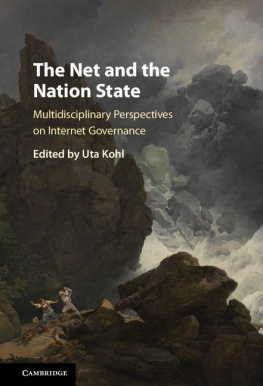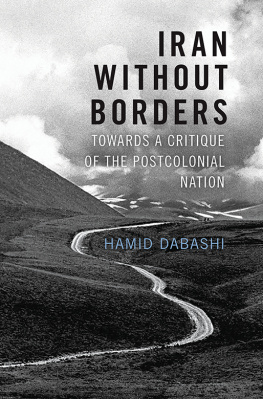
FRONTIER FICTIONS
FRONTIER FICTIONS
SHAPING THE IRANIAN NATION, 18041946
Firoozeh Kashani-Sabet
PRINCETON UNIVERSITY PRESS PRINCETON, NEW JERSEY
Copyright 1999 by Princeton University Press
Published by Princeton University Press, 41 William Street,
Princeton, New Jersey 08540
All Rights Reserved
Library of Congress Cataloging-in-Publication Data
Kashani-Sabet, Firoozeh, 1967
Frontier fictions : shaping the Iranian nation, 18041946 / Firoozeh Kashani-Sabet.
p. cm.
Includes bibliographical references (p. ) and index.
ISBN 0-691-00497-8 (cloth : alk. paper)
1. NationalismIranHistory19th century. 2. NationalismIranHistory20th century. 3. IranBoundaries. I. Title.
DS299.K36 1999
955.05dc21 99-20127 CIP
This book has been composed in Galliard
The paper used in this publication meets the minimum requirements of ANSI/NISO Z39.48-1992 (R 1997) (Permanence of Paper)
http://pup.princeton.edu
Printed in the United States of America
10 9 8 7 6 5 4 3 2 1
To Our Mother, Fereshteh
My Brother, Mohammed
And in the Memory of Our Father,
Mohammed Hossein ___________________________________
Contents
Illustrations
Acknowledgments
T WO TUMULTUOUS EVENTSthe Islamic Revolution of 1979 and the Iran-Iraq War of 198088altered the course of my life. As fate would have it, I would spend the better part of my academic career figuring out the reasons for these developments. While this forum remains an inadequate platform for the discussion of my (mis)adventures, I feel compelled to remember all the individuals who have enlivened my intellectual pilgrimage. For me, this work represents the culmination of a twenty-year scholarly apprenticeship. I have accumulated many debts along the way, and it is finally payback time.
Generous fellowships from the Yale Center for International and Area Studies, the Smith Richardson Foundation, the Bradley Foundation, and the Mellon Foundation made it possible for me to travel to Iran, where I met numerous scholars engaged in exciting research. In particular, I would like to acknowledge the kindness and support I received from Dr. Mansoureh Ettehadieh Nezam-Mafi, whose example I can only hope to follow. Similarly, Mr. Kaveh Bayat met with me several times and opened up his impressive personal library to me. Thanks to him, I was able to find some useful pamphlets, which I have acknowledged in the body of this work. The staff at the various archives and libraries where I spent my days willingly guided me to the necessary sources. I would especially like to acknowledge the generosity and support that Mr. Laylaz and Mr. Baqai showed me at the National Archives (Sazman-i Asnad-i Milli-yi Iran). I also appreciate the patience and assistance of the entire staff, who put up with my many demands. I could not have hoped for a more helpful crew.
I am very grateful to Mr. Kavusi at the Ministry of Foreign Affairs for granting me permission to peruse and photocopy the files I needed there. I must also recognize Ms. Azimi for her friendly assistance in locating the necessary files at the archives of the ministry of foreign affairs. At the National Library Ms. Babak kindly arranged to microfilm in a timely manner the manuscripts I had selected for my work. This study would have been considerably less informative were it not for the manuscript sources I obtained from the National Library. At the Cultural Institute (muassisah-i pazhuhish va mutaliat-i farhangi) on Fereshteh Avenue, I had the good fortune of knowing one of the librarians, Ms. Nazi Razdar. She arranged for me to meet the supervisor, Dr. Zargari Nizhad, who gave me permission to peruse a select number of documents. The library staff also showed me its gracious hospitality by making its books and newspapers readily available to me. I must also thank Ms. Malik for arranging a private tour of her familys library, the Kitabkhanah-i Malik.
My family members and friends made my stay in Iran pleasant and productive. On the Samii side, I would like to acknowledge my deepest gratitude to Mr. Husayn Samii for his constant intellectual and personal support. I would also like to thank Dr. Fereydun Samii, his wife, and his sister-in-law for helping me gain access to the library at the University of Tehran. I also thank my uncles, Iraj Samii and Khusraw Samii, for their support and interest in my work. On the Kashani-Sabet side, I would like to express my love and gratitude to my uncle, aunt, and cousins. Without access to their computers and printers, writing would have proved even more frustrating. To my friends Pari and Bijan Khajehpour, I express my heartfelt thanks for their professional and personal assistance. I hope I can make it up to them when they visit America.
Words alone cannot convey my indebtedness to my uncle, Mr. Shahravan, who tirelessly accompanied me from library to library and archive to archive. His humor, generosity, support, and wisdom sustained me through some difficult days in Iran, giving me the strength to continue my research in the face of serious obstacles. I feel most privileged to have made his acquaintance and to have been a beneficiary of his kindness and common sense. His family has also shown me much love and support, and I am grateful to all of them for their generosity.
Back in America, scholars from various universities read parts of my work or provided intellectual support. I would like to acknowledge the academic training I received from Professor Gerhard Bwering throughout my years at Yale University. In addition, during my coursework I participated in a graduate seminar led by Professor Diana Wylie, whose elegance and poise made the seminar exciting and informative. I am pleased that my first article grew out of a paper that I had written in her class. Next, I would like to thank Dr. Afsaneh Najmabadi for her careful analysis of several chapters, her constant encouragement, and her friendship. A generous and insightful scholar, Dr. Najmabadi is certainly a boon to our profession. I must also recognize the useful written comments and advice I have received from Dr. Ervand Abrahamanian, one of the readers of my dissertation. In addition, Professor Firuz Kazemzadeh, one of my teachers at Yale, read the entire manuscript and provided important comments, for which I am very grateful. I would also like to thank Dr. Cyrus Amir-Mokri for his advice on various matters as well as for his friendship. I also appreciate receiving a copy of his excellent dissertation from him, since it was unavailable to me through other means. Dr. M. Tavakoli-Targhi also read a chapter of my dissertation, and I appreciate his helpful suggestions. I must express my gratitude to Professor John Faragher, who willingly came on board to serve as a reader of my dissertation. I am also appreciative that Professor William Roger Louis read my manuscript during his brief visit to Yale and offered valuable insights. I would also like to thank all the reference librarians at Sterling Memorial Library for their assistance, especially Dr. Sue Roberts. I must also thank Ms. Florence Thomas, whose decency, professionalism, and support made the history department a happier place for me. I would not have gotten through the yearindeed, through graduate schoolwithout her help and generosity.
In 1995, I participated in a scholar exchange program with Princeton University. At Princeton, I benefited from the advice of many scholars in the Near Eastern Studies department, in particular Professor Michael Cook and Dr. Modarressi, both of whom read one chapter of the dissertation. I would also like to thank Professor Gyan Prakash for providing me with the opportunity to become his teaching assistant and for sharing his views on nationalism with me. I am most grateful to Professor kr Haniolu, whose brilliance and intellectual virtuosity would have proved extremely daunting were it not for his sensitivity and kindness. Professor Haniolu generously took me under his wing and I have profited enormously from his personal and professional advice. Many students also opened up their homes to me while I was at Princeton. I would especially like to thank Janet Klein and Jocelyn Sharlet for their friendship and support. I would also like to acknowledge Dr. James Weinberger and Ms. Azar Ashraf at Princeton Universitys Jones Library for their assistance and for locating all the sources I needed. Finally, I am especially grateful to Mr. Walter Lippincott and the entire staff at Princeton University Press for their professionalism and support as well as their many positive contributions to my manuscript.
Next page
